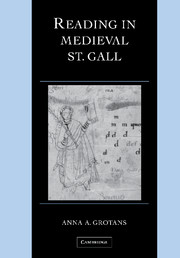Book contents
- Frontmatter
- Dedication
- Contents
- List of plates
- Acknowledgments
- List of abbreviations
- Manuscript punctuation and other symbols
- Introduction
- 1 Medieval reading
- 2 Education at ST. Gall
- 3 Language use and choice
- 4 The ST. Gall Tractate
- 5 Discretio in the classroom
- 6 Accentus
- 7 Spelling for reading
- Bibliography
- Index of manuscripts
- General index
6 - Accentus
Published online by Cambridge University Press: 13 May 2010
- Frontmatter
- Dedication
- Contents
- List of plates
- Acknowledgments
- List of abbreviations
- Manuscript punctuation and other symbols
- Introduction
- 1 Medieval reading
- 2 Education at ST. Gall
- 3 Language use and choice
- 4 The ST. Gall Tractate
- 5 Discretio in the classroom
- 6 Accentus
- 7 Spelling for reading
- Bibliography
- Index of manuscripts
- General index
Summary
Accentus est anima verborum sive vox syllabae.
quae in sermone plus sonat caeteri syllabis
In his letter to Bishop Hugo of Sion, Notker Labeo justifies using Old High German translations to teach young pupils Latin. He argues that although his pedagogic approach may strike some as unusual, perhaps even outrageous, it is nonetheless practical and aids greatly in reading and understanding. Immediately following the justification, in what almost appears to be an afterthought, Notker provides some guidelines for writing and pronouncing OHG:
Oportet autem scire quia uerba theutonica sine accentv scribenda non sunt. præter articulos ipsi soli sine accentu pronuntiantur acuto aut circumflexo
[One should know, however, that German words are not to be written without accents except for articles. These alone are pronounced without an accent, be it acute or circumflex.]
According to Notker, all German words except articuli are to be written and pronounced with acute or circumflex accents.
Notker's comments about the use of accents in OHG have fascinated philologists and linguists ever since Jacob Grimm first published the letter in 1835. They represent one of those rare instances of an eyewitness account regarding the linguistic nature of OHG and testify to the care with which Notker intended his mother tongue to be recorded and pronounced.
- Type
- Chapter
- Information
- Reading in Medieval St. Gall , pp. 249 - 284Publisher: Cambridge University PressPrint publication year: 2006

